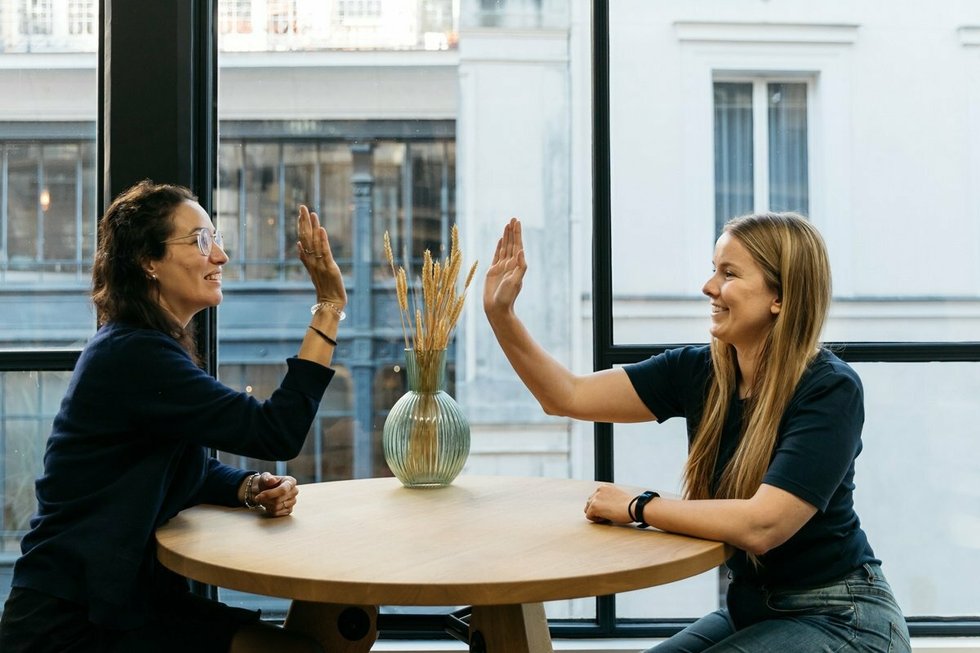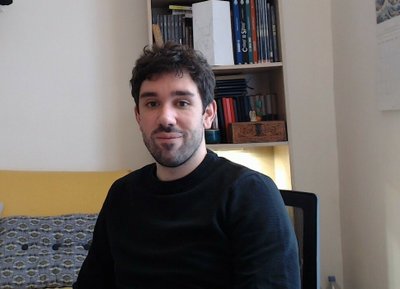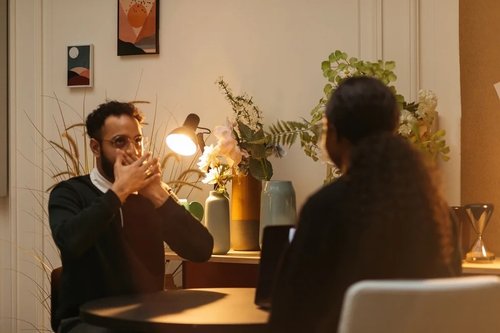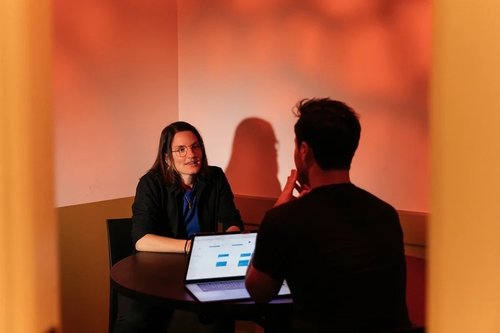Why you shouldn't trust a 'good vibe' during a job interview
Dec 08, 2021
7 mins


Rédacteur
When it comes to job interviews, it’s hard to see things from a purely rational and objective point of view. You may come away thinking: “I’ve got a good feeling about them.” “We definitely clicked” or even “I wasn’t feeling it.” People are far more likely to turn to emotion and instinct at times like this. Whether you’re the recruiter or the candidate, everyone expects a job interview to spark a certain amount of chemistry. But as this notion of “chemistry” is based on mainly unconscious mechanisms, it’s hard to explain it in rational terms. So, what role does chemistry play in a job interview? And is it a reliable indicator of the relationship that develops during an interview?
Erwan Deveze, a neuroleadership and neuromanagement consultant reveals what’s really behind chemistry and what we can do to make it happen.
A largely unconscious process
Having chemistry or being on the same wavelength is often seen as an unchangeable feeling that is created between two individuals and that says something about the intrinsic quality of a person. This is what’s implied by the expression “to be on the same wavelength.” In a job interview, you might come to the conclusion that you’ve found the best candidate for the position. But according to Deveze, it’s not as simple or straightforward as that. For him, chemistry is based on “a whole set of unconscious sensors that come into play during an interview and that have considerable influence on your mental state, emotions, and the impression you have of the other person.”
And the questions and answers –– what you likely imagine to be the most objective part of the interview –– are only the tip of the iceberg when it comes to creating chemistry. “It’s believed that only 10% of the brain’s activity is conscious while 90% comes from the unconscious. When you’re in a face-to-face recruitment interview, there’s obviously a lot involved in creating chemistry, the vast majority of which goes unnoticed.”
A stressful and complex situation
If the unconscious seems to have the starring role, that’s because job interviews are a time when most of us are at our least natural. According to Deveze, even successful interviews with friendly banter can be nerve-racking experiences that the brain perceives as a threat. “Your brain then sets to fighting this threat by scanning the entire situation, even if it has nothing to do with the interview. There are many potential biases at work, especially in a job interview.” Here are some of them.
The senses at play
Sometimes, it doesn’t take much for there to be a lack of complicity in interviews. “Our senses play a major role in creating chemistry,” said Deveze. For example, the olfactory system can be a determining factor in how you perceive someone. “Simply wearing a fragrance that triggers a negative memory in the recruiter can create a more or less unconscious bias which distorts the chemistry between you.”
Voice is another sense that impacts the rapport between interviewee and interviewer. Tone and delivery are known to play a major role in the “feeling” you get from someone, irrespective of what they are actually saying to you. This has been demonstrated in several studies. For example, a study for the Royal Society on the perception of leadership through voice pitch concludes that people trust someone with a low, calm tone of voice more than someone who speaks in a high-pitched voice. However, the stress of a job interview can make you speak more quickly and in a high voice, which threatens to dissolve any chemistry between recruiter and candidate.
Give chemistry the time of day
When it comes to interviews, context is everything. For example, a small detail such as the time of your interview can change the way people feel and ruin what would otherwise be good chemistry. “When you have a job interview at noon, the whole morning is behind you,” said Deveze. “You’re probably going to be hungry, and your energy levels aren’t what they were at 9AM.”
This may seem insignificant, but in practice, this is a hugely influential bias that was highlighted by an American study published in 2011 in the journal of the National Academy of Sciences analyzing the mental processes behind judges’ decisions in parole cases. “If your case was submitted at 9AM, you had a 70% chance of being accepted for parole, no matter what,” said Deveze. “But if your case was submitted at noon, your chances plummeted to 0%. You had no chance of being released on parole. At noon, the judges were tired, hungry, and not as emotionally invested. They’d be more likely to postpone their decision.”
With so many outside influences, subjective factors, and biases involved in creating chemistry, it’s hard to trust “instinct” as a sound indicator.
What does chemistry teach us?
Instinct is a product of the brain’s evolution
For Deveze, all of these questions can be answered by the evolution of the human brain: “In human evolution, the group was synonymous with survival. If you were unlucky enough to find yourself alone, it was a sign of imminent death. When it comes to interpreting emotional states, we’re more in tune with people who are similar to us because they are more likely to fit in with the group and help us in a specific situation.” When there’s good chemistry in a job interview, the recruiter can better gauge the candidate’s ability to integrate into their future team. In this event, it’s perfectly normal to look for people you feel you could work with easily.
Things only become problematic when the affinity we have for those who resemble us causes recruiters to overlook candidates who may well have been more suitable for the job. “When you’re face-to-face with someone who doesn’t share the same codes as you, this activates the brain circuits involved in responding to threat. This feeling is upsetting and uncomfortable, which nobody likes. On the other hand, if the other person is similar to you, it builds a sense of rapport and mutual trust. That’s why someone who ‘resembles’ the recruiter is more likely to be chosen, even when they aren’t as good a match, objectively speaking.”
This kind of chemistry is not a hard science
It can be hard to admit, but this kind of chemistry is totally subjective and unconscious. For Deveze, it’s important to remember this with humility because most people tend to think they are more rational than they are. “We overestimate ourselves, and we overestimate our ability to be objective,” he said. “We think we’re infallible and that our feelings are the objective result of the interview, but this is an illusion.” This particular cognitive bias has been demonstrated by the work of Kruger and Dunning. It’s also at play in the so-called “third person effect.” Tested by sociologist W Phillips Davison, this theory explains how people think they are more objective and less suggestible than others.
But, ultimately, the only real issue is the importance assigned to chemistry when determining our choices and relationships. Instead of using it as the sole indicator of the quality of an interview –– and when you’re the candidate, the company itself –– it should be considered as one factor among many, such as the context or physical environment, what people are saying and the stress of being in an interview.
It’s easy to feel like your interview has been a major fail. You may think your approach was wrong or that you haven’t made a good impression because there was no spark. Candidates often perceive these subjective impressions as rational facts. But the recruiter may not see things the same way and could simply have been having an off day.
“We’re generally hypervigilant during a job interview. We overthink things and tend to focus on certain details while forgetting the rest,” said Deveze. That’s why it’s important to put emotions in context, unpack them to see if they’re in sync with reality, and remember that they are subjective. After all, it’s not uncommon to be pleasantly surprised after an interview that was otherwise deemed a disaster.
Create your own chemistry
Turn the tables
Chemistry isn’t just an aspect of the interview that needs addressing. It can also be cultivated and developed.
In the context of a job interview, for example, you can foster chemistry by shifting the power dynamics. Deveze suggests achieving this by conducting interviews in a park or out in nature. “Neuroscience has shown that the brains of both the recruiter and the candidate are stimulated when you conduct an interview out in nature,” he said. “Neurobiological mechanisms can then transform the quality of the interview itself. The strict hierarchy tends to disappear, which can help you be more sincere and authentic. You’ll be in a better emotional state than if you were surrounded by office walls, which is a good thing in interviews.”
So, if your recruiter is open-minded and you’re able to suggest a venue for the interview, consider choosing a park or other natural setting as a way to foster chemistry.
Plan ahead to create chemistry
Next, taking a more strategic approach, you can play on the chemistry you’ve cultivated to stand out from other candidates. Deveze recommends working on how to foster a positive “vibe” with your recruiter by limiting any potential for discomfort on the day of the interview. “To build rapport, you need to feel good on the day of the interview, and this requires the right preparation. It’s important to choose comfortable clothes and do some recon so that you’re familiar with the interview’s location. You should also work on your diction, tone of voice, and body language by filming yourself.” By preparing everything in advance, you’ll feel more self-assured on your big day.
According to Deveze, you can also build rapport with your interviewer by observing their body language and micro expressions, and imitating them in a subtle manner. “From one brain to another, there’s a kind of “neural wi-fi” mechanism called the mirror neuron system. When you’re face-to-face with someone who uses the same gestures as you, your defenses go down. If you’re clever enough to do mental synchronization or brain-tuning, which involves subtly mimicking the recruiter’s gestures, there’s going to be more chemistry at the unconscious level.” For more on how to master this technique without spooking your recruiter, check out this article.
For the perfect ending to your interview, Deveze suggests a simple technique. “Don’t forget to smile! Both positive and negative emotions are naturally contagious. When you smile, you reassure the other person and make them feel happy.”
Translated by: Andrea Schwam
Photo: Welcome to the Jungle
Follow Welcome to the Jungle on Facebook on LinkedIn and on Instagram and subscribe to our newsletter to get our latest articles every day!

More inspiration: Job interview survival guide
Ace your job interview with our comprehensive guide. From preparing for different recruiters to managing informal moments, our tips and techniques will help you shine.

Beyond the basics: advanced strategies for researching a company before an interview
Want to show off your knowledge and impress the recruiter? Don't skip out on the in-depth researching stage of preparing for an interview!
Mar 29, 2023

Interview faux pas: 10 mistakes you didn't know you were making
Want to ace your next job interview? Here are 10 common mistakes to avoid, according to career expert Alan Stein.
Mar 21, 2023

People-pleasing in an interview: how a minion mentality can derail your career
"Yep, sure, no problem, I can do that!" People pleasers, beware. Overselling yourself to the recruiter could come back to bite you...
Dec 13, 2022

Interviewing with a friend: the pros, the cons, and how to handle it
Thanksgiving is the perfect time for catching up with loved ones, eating great food, and ... networking?
Nov 22, 2022

The secret art of selling yourself in an interview
Beyond convincing the recruiter your skills and experiences are relevant, you need to be able to sell YOU. A personal branding expert shares his tips.
Nov 10, 2022
The newsletter that does the job
Want to keep up with the latest articles? Twice a week you can receive stories, jobs, and tips in your inbox.

Looking for your next job?
Over 200,000 people have found a job with Welcome to the Jungle.
Explore jobs